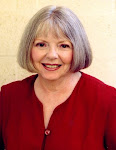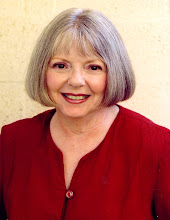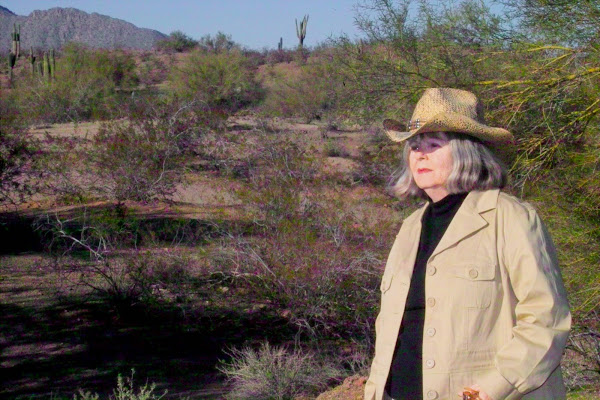Vicki Delany is the author of In the Shadow of the Glacier, Scare the Light Away, and Burden of Memory. We talked recently about her writing life -- past, present, and future.
BETTY WEBB: When I read the set-up of In the Shadow of the Glacier, I thought, “Ohmigod, why hasn’t some one thought of this before? It’s such a GREAT idea!” Want to address that?
VICKI DELANEY: The draft dodger memorial idea was, as they say, ripped from the headlines. That actually happened, although to a lesser degree than it does in In the Shadow of the Glacier. The fictional town of Trafalgar is based on the real town of Nelson, British Columbia. One of my daughters lives in Nelson, and I just love it there. Nelson was a major settling place for Vietnam era draft dodgers fleeing the U.S. for Canada. A lot of them still live there. About 2 years ago, someone offered the town a statue. It showed two people greeting a draft dodger. It was, in fact, pretty innocent. But it was immediately controversial, and the news even spread as far as the New York Times and Fox News. And people in Nelson were genuinely worried that it would negatively affect the tourist trade. The town didn't accept the statue and that was the end of that. But I thought... um, I wonder what would have happened if the story kept growing. And thus I wrote it into the book. One thing that I didn't touch, although I may some day, is that once again Nelson is taking in U.S. 'refugees'. Although this time they are 'war resisters', deserters from the U.S. Army who don't want to go back to Iraq. They are not getting as friendly a reception from the government as they got in the '70s and I believe that the first of them has been ordered deported.
BETTY: Are you personally familiar with some of the anti-war protesters who fled to Canada in the 60s and 70s?
VICKI: Not really. I have met former U.S. draft dodgers, but I don't know anyone well enough to say they're friends.
BETTY: Where do you live? Spend much time in British Columbia?
VICKI: In June of this year, I moved to Prince Edward County, Ontario. That's about two hours east of Toronto. It's a beautiful area, very rural, still full of farms and small towns. There is a field of wheat the other side of my driveway and a field of corn across the road. I live in a hundred-year-old farmhouse. I retired last year and sold my house in Oakville (very suburban, took the train into Toronto every day) and spent a year traveling across North America. Most of the year I was in Nelson, where I worked on the new book, Valley of the Lost, and made friends with the Nelson City Police and the RCMP (Royal Canadian Mounted Police) who helped me a lot with the book. But a year was enough to be living in other people's houses and so I bought this house. I have to be very focused to write - all or nothing, so to speak. I write amost every morning while I consume a LOT of coffee. I usually put in three to four hours and then put the writing aside for the day. As you know, there's more work involved in having a writing career than writing, so throughout the day I'll do the other things, such as write for my blog, proofreading, arrange signings etc. etc. I find that since I've stopped working full time, I don't spend any more time writing, but I have a lot more time for promotion.
BETTY: You have a very unusual female police officer, Constable Moonlight “Molly” Smith in In the Shadow of the Glacier. She lives with her mother, doesn’t have a car, has a sappy real name, and she CRIES. Were you nervous about portraying such a character?
VICKI: Molly sort of evolved to be the way she is. When I started the series, I intended it to be a lot darker than it turned out. I found that I just can't write too dark. For example, Sergeant Winters was intended to die at the end of the first book, sending Molly to the big city in search of vengeance. Instead he's now the other main series character, and she's still on the force. I recently heard that 23 percent of police officers in British Columbia are women, so although there are still pockets of male officers resentful of women in the job, it is getting easier for women officers to BE women. Molly still lives at home with her parents, but that isn't because she's childish. Her fiancé was killed in a tragic and preventable incident and Molly came home to put her life together. She then realized that she wanted to be a cop, and applied to the force in the town where she lives. To her, and everyone else's, surprise, she got in, and she just hasn't gotten around to finding a place of her own yet. When the series begins Molly is 26 years old. I have three daughters in their twenties, so I guess Molly is the way I view young women today. Strong, confident, high-achieving, but with teddy bears on their beds and antique tea-cup collections. Molly has the additional baggage of the death of her fiancé hanging over her. Her career is going well, but her emotional life is a mess.
BETTY: And how about poor Molly/Moonlight’s mother, Lucy, known to her friends as “Lucky”? She’s a sensational character, too. Tell me about her.
VICKI: Molly's parents are from Seattle and came to Canada when her father got his draft notice. Her mother, Lucy, who everyone calls Lucky, is still very politically active, whereas Molly's dad, Andy, just wants to settle into a quiet, peaceful middle-age. Lucky is very much like a lot of women I know, still fighting for social justice, still as passionate as they ever were. Lucky's involvement in every environmental or political issue in town causes a lot of embarrassment for the young police woman. But at the heart, Molly's family is very strong, very supportive, and thus she is still living with her parents while she tries to sort her emotional life out. I see the relationship between Lucky and Sergeant Winters as one of the focal points of the series - they should be antagonists, but they respect each other too much, and that respect, plus the personality of Molly, draws them together. Oh, yes, Molly's name. The name on her birth certificate is Moonlight Legolas Smith. Remember her parents were hippies. Moonlight because of the moon shining on fresh snow the night she was born, and Legolas because her parents were Lord of the Rings fans (aren't we all, who were young in the '70s). Molly's brother, who is a lawyer with an oil firm, is named Samwise. In the second book, Valley of the Lost, Andy Smith thinks: Lucky’d taken Moonlight’s change of name as a personal rebuke, but Andy figured that she had to do it if she wanted to be taken seriously in the police world. You couldn’t be called Moonlight when your colleagues had four letter names like Paul, Dave, John.
BETTY: Molly’s relationship with John Winters, her superior officer, is also unusual. He is VERY much her superior, thinks she should still be on the beat, not working a homicide, and yet he still want to be on a first name basis with her -- which implies equality.
VICKI: Nothing deep there. It is normal in a small-town B.C. police station for everyone to call everyone by their first name. In the presence of the public, particularly young people, they will use rank and last name, but not amongst each other. Although some of the more traditional guys might call the sergeant, Sarge.
BETTY: At the beginning of the book, the little Canadian town of Trafalgar sounds like a town most people would love to live in -- but by the end of the book, we’re not so sure. Tell me about that town and what went into designing it.
VICKI: As I mentioned above, Trafalgar is based on the real town of Nelson, B.C. Nelson is in the B.C. Interior (meaning not near the ocean). It is very isolated - an eight-hour drive from both Vancouver and Calgary. The nearest city is actually Spokane Washington. The town is surrounded by wilderness and mountains so the isolation plus the geography give it a very insular feeling. It is a very arts town, full of artists of all types, and a lot of young transients drift through. On the other hand, the town has begun to attract the wealthy early-retired types which is driving up property values and squeezing out the transients and struggling artists. Which also raises issues of environment vs. development. When I was in Sedona, Arizona last year at the Well Red Coyote Bookstore, the store owner introduced me by saying that Trafalgar reminded her a lot of Sedona. The biggest difference between Trafalgar and Nelson is the crime rate! They haven't had a murder in Nelson in years, there has never been a bank robbery, the streets are completely safe even in the middle of the night, hard drugs are not a major problem (marijuana is the area's number one industry though! - more about that in another book) and the only recent gun incident the police could recall to tell me was someone shot up someone's car and the police figured it was a warning. So please, don't let events in Trafalgar stop you from visiting Nelson, my favorite place in all the world.
BETTY: What was the hardest part of the book to write?
VICKI: The hardest part in general was probably trying to get Molly right. She's new to the police, is still on probabation, so she had to be pretty green and nervous. And then she's thrown into this murder investigation which is way over her head. I wanted her to make mistakes, but not mistakes that might make her look, to her superiors as well as to the reader, like an idiot. I made her very unsure of herself, always second guessing herself, but with a rock of self-confidence
lying underneath all of that.
BETTY: I always ask this question on my blog: Give beginning mystery writers some advice, whether it be about the writing itself, finding a publisher, or letting the world know about the book once it’s published. You can discuss each item, if you wish.
VICKI: My main piece of advice to the beginning writer is be persistant. You simply can't give up. If you start a book, finish it, don't give up half way thinking that it isn't working - finish it and make it work. Then start a second book while the first is doing the rounds of the agents and publishers. If the first book can't find an agent or a publisher, finish the second book, and send it around while working on the third book. And while you're writing - read. I think this is something you emphasise as well, Betty. You can't write in a vacumn. You have to know what's out there, what other people are writing, what's popular, what works and what doesn't.
BETTY: I hear you’re writing a follow-up. Can you tell us when it’ll come out and what it’s going to be about? Will Molly and Winters return?
VICKI: The second in the Smith and Winters series is titled Valley of the Lost. It will be released in February 2009 from Poisoned Pen Press. In addition, I'm taking a leaf from Betty Webb's book, and writing a second series. The first book is called Gold Digger: A Klondike Mystery, and will be out from Rendevous Crime, a Canadian publisher, in April 2009. It is a historical series, set in the Klondike Gold Rush, and is, I hope, a comedy. Gold Digger is a good example of the importance of persistence. It was written even before my first book from Poisoned Pen Press, Scare the Light Away. I got a contract for it almost right away with a publisher of historical non-fiction in the Yukon. Whereupon it languished for more than a year before the publisher went out of business. After that I found an agent for it. The agent did nothing with it for another year, and eventually I placed it with Rendevous Crime. These days, I'm working on the third Smith and Winters book, as yet untitled, but it has a lot of skiing in it.
BETTY: Your series is set in Canada, but published in the U.S. for an American audience. Does that present you with any difficulties?
VICKI: When I do book tours in the U.S. I often talk about the differences between U.S. and Canadian policing. One of the main differences, and there are many, is that Canadian police officers are not allowed to carry their guns when off duty. At the end of In the Shadow of the Glacier, Molly is in civilian clothes and all she has to defend herself with are her cell phone and her stiletto heels. So I have a tricky job of explaining to my U.S. audience why certain things are happening, without appearing to be explaining. On the other hand, some American readers think that Canadian police must be just like the British, and wonder why John Winters is 'just' a Sergeant and not a DI. I'd like to add that I got a lot of help from members of the Nelson City Police and the Nelson detachment of the RCMP. I have no background in law enforcement at all, so I wouldn't have been able to write the book without help.
To learn more about Vicki and “In the Shadow of the Glacier,” check her web site at
www.vickidelany.com (which has pictures of Trafalgar!), or visit her blog at http://typem4murder.blogspot.com
Monday, August 4, 2008
Subscribe to:
Post Comments (Atom)










No comments:
Post a Comment